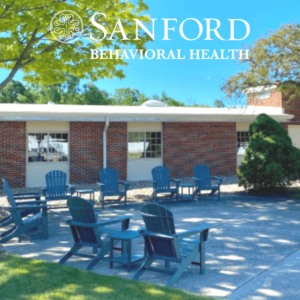5 Benefits of Residential Eating Disorder Treatment
 Heading into an eating disorder program may bring up feelings of anxiety and uncertainty, especially if you don’t know what to expect in residential eating disorder treatment. Once you push past the initial discomfort, you’ll discover that the benefits of residential eating disorder treatment bring life-changing effects.
Heading into an eating disorder program may bring up feelings of anxiety and uncertainty, especially if you don’t know what to expect in residential eating disorder treatment. Once you push past the initial discomfort, you’ll discover that the benefits of residential eating disorder treatment bring life-changing effects.
At Sanford Behavioral Health, we offer both residential and outpatient programs for eating disorder treatment. Call 616.202.3326 today to learn more about the benefits of the residential programs at Sanford Behavioral Health.
5 Benefits of Residential Eating Disorder Treatment
It’s common for patients to have questions like, “How long is a residential treatment for eating disorders?” The length of treatment varies but is usually three to four weeks long.
Patients adapt quickly, building close relationships with peers and staff. A supportive environment and effective programs result in a rewarding treatment experience that brings hope for the future.
When you commit to entering a program, the benefits of residential eating disorder treatment open the door to a much healthier way of life.
1. Continuous Accountability
The thoughts and behaviors associated with eating disorders can be challenging to overcome. It takes time to build the skills necessary to sit with triggers and respond to them in a healthy way.
The level of supervision offered in a residential program provides the support and accountability patients need to refrain from unhealthy behaviors. Staff members work with patients to help them cope with urges and choose different responses.
2. Increased Understanding of Eating Disorders
An individual who struggles with an eating disorder is familiar with their personal experience. Often, eating disorders manifest through:
- Cycles of binging and purging
- Dieting and restricting food
- Inducing vomiting
- Exercising excessively
- Using laxatives or diuretics
- Mental and emotional health issues related to food or self-image
Therapy provides broader education on how eating disorders work and how they impact the individual. This knowledge becomes a powerful tool for dealing with recovery challenges.
3. Professional Mental Health Support
Eating disorders are directly related to mental health. Patients receive general support for managing unwanted or intrusive thoughts and feelings, particularly in areas related to guilt, shame, and self-esteem.
4. Treatment for Co-Occurring Concerns
It’s common for eating disorders to occur in conjunction with other mental health concerns. Some of the most common include:
- Depression
- Anxiety disorders
- Personality disorders
- Self-harm
- Substance use
Co-occurring treatment can provide comprehensive care for all conditions contributing to an eating disorder or making the recovery journey more challenging.
5. Learning Healthy Coping and Communication Skills
Developing coping skills is a central part of eating disorder treatment. Communication is emphasized as a core coping skill. Patients who learn to ask for help and express their feelings are less likely to keep things bottled up and fall back into old habits.
What to Expect in Residential Eating Disorder Treatment
A residential eating disorder treatment program is a unique experience. Patients live at the treatment facility, where they receive continuous support from compassionate staff members.
Patients form relationships with others who share similar struggles with food and self-image. They receive education and training through traditional and experiential therapies that create a strong foundation for eating disorder recovery.
Patients who begin a program feeling anxious about questions like, “How long is a residential treatment for eating disorders?” often find themselves sad to leave behind the friendships created with peers and staff members.
Ask About Sanford Behavioral Health’s Eating Disorder Treatment Programs
The programs at Sanford Behavioral Health are designed to provide individual care to each client, so you receive the support that can lead to a lasting recovery.
We offer both residential and outpatient care for eating disorders as well as supportive housing. Our patients continue to stay connected to our recovery community through participation in our alumni program.
Contact us at 616.202.3326 for more information on how we can help you start your recovery with eating disorder treatment at Sanford Behavioral Health.


